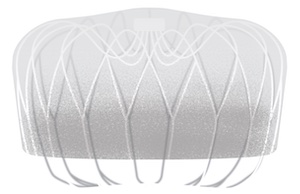A One-Time Implant that Helps Reduce AFib Stroke Risk
 The WATCHMAN FLX™ Pro implant is a minimally invasive, one-time procedure that reduces stroke risk without the worry that comes with lifelong blood thinners.
The WATCHMAN FLX™ Pro implant is a minimally invasive, one-time procedure that reduces stroke risk without the worry that comes with lifelong blood thinners.
Atrial fibrillation (AFib) is an irregular heartbeat that feels like a quivering heart. People with AFib may be at greater risk for stroke than those with normal heart rhythms. WATCHMAN FLX Pro is a one-time, minimally invasive procedure for people with atrial fibrillation not caused by a heart valve problem (also known as non-valvuar AFib) who need an alternative to blood thinners. It’s about the size of a quarter and made from very light and compact materials commonly used in many other medical implants.
The WATCHMAN FLX Pro device closes off an area of the heart called the left atrial appendage (LAA) to keep harmful blood clots that can form in the LAA from entering the bloodstream and potentially causing a stroke. The device creates a permanent barrier. By closing off the LAA, the risk of stroke may be reduced and, over time, patients may be able to stop taking blood thinners.
Find a cardiologist
To make an appointment with a cardiologist, please contact our physician referral line at 803-761-6970 or search for a physician online.
Features of WATCHMAN FLX Pro
WATCHMAN FLX Pro is designed with three unique features:
- New HEMOCOAT Technology designed to improve the healing process
- Radiopaque markers for precise device placement
- A new 40mm size for larger appendages
How is WATCHMAN FLX Pro implanted?
 WATCHMAN is implanted into your heart in a minimally invasive, one-time procedure. To implant WATCHMAN, your doctor makes a small cut in your upper leg and inserts a narrow tube, as done in a standard stent procedure. Your doctor then guides WATCHMAN into your heart’s LAA. The procedure is done under general anesthesia and takes about an hour. Patients commonly stay in the hospital overnight and leave the next day.
WATCHMAN is implanted into your heart in a minimally invasive, one-time procedure. To implant WATCHMAN, your doctor makes a small cut in your upper leg and inserts a narrow tube, as done in a standard stent procedure. Your doctor then guides WATCHMAN into your heart’s LAA. The procedure is done under general anesthesia and takes about an hour. Patients commonly stay in the hospital overnight and leave the next day.
Is WATCHMAN FLX Pro right for you?
If you have a history of bleeding or a lifestyle, occupation or condition that puts you at risk for bleeding, WATCHMAN may be right for you. But like any medical procedure, WATCHMAN comes with risks, so it isn’t right for everyone. Your cardiologist will weigh your risk of a stroke against your risk of a serious bleeding problem to determine the right treatment for you.
Watch this video to learn more about the benefits of WATCHMAN and if it is right for you.
*Individual results may vary. There are risks associated with any surgical procedure. Talk with your doctor about these risks to find out if minimally invasive surgery is right for you.
